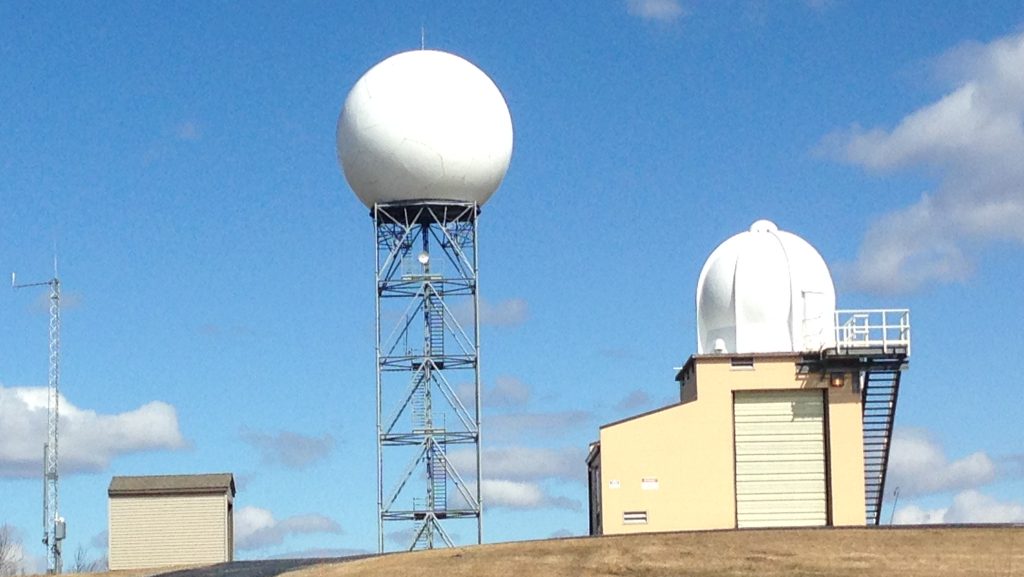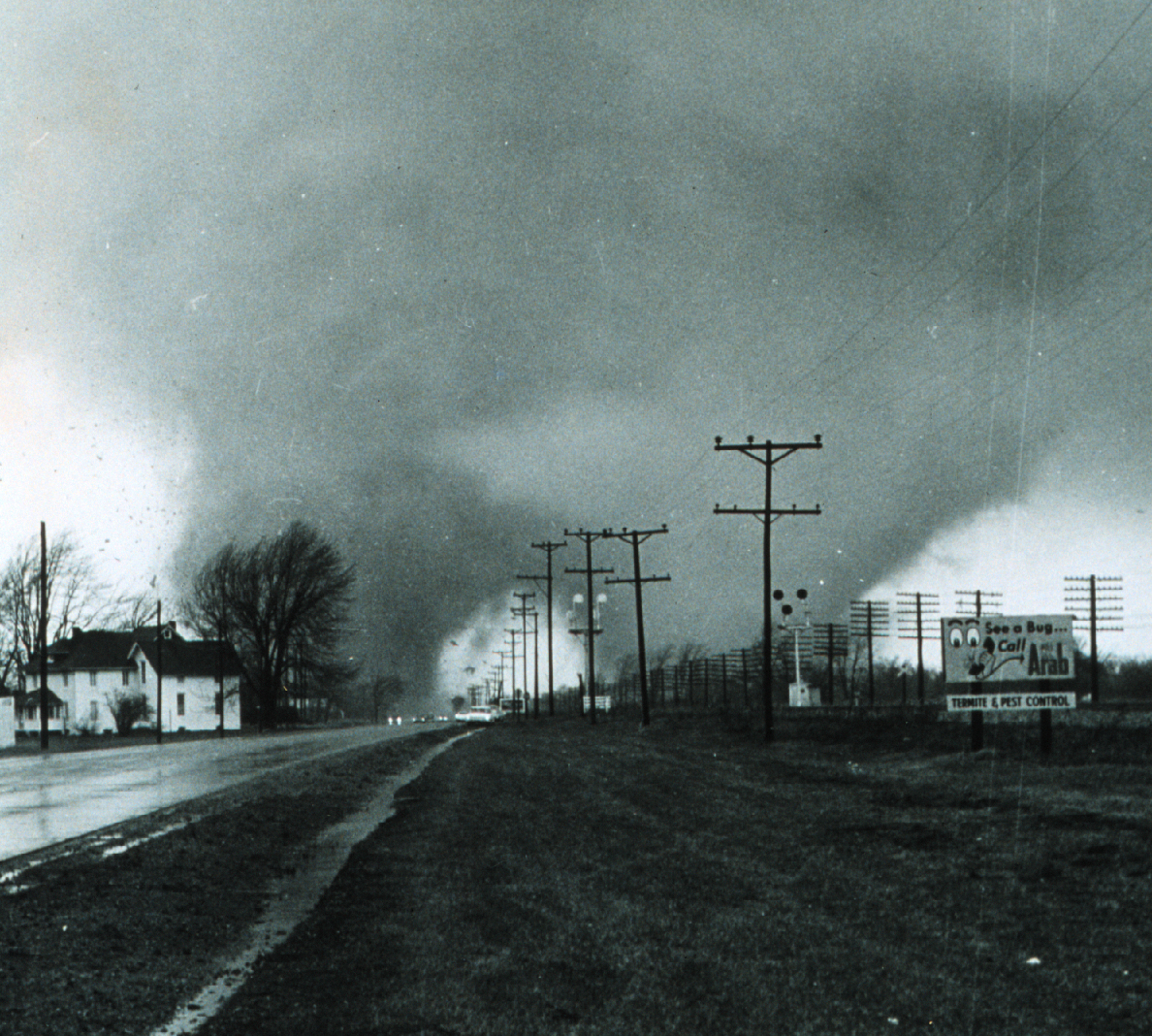Tornado Outbreak on April 11, 1965 Kills Hundreds in Midwest
Nearly 300 killed and more than 3,400 injured in the Midwest during 1965’s Palm Sunday tornado outbreak.

The National Weather Service's Detroit forecast office is in White Lake Township.

On April 11, 1965, 47 tornadoes descended on the Midwest, leaving 271 dead and more than 3,400 injured in just 12 hours’ time. Michigan was among the hardest-hit states.
The Palm Sunday tornado outbreak was one of the most severe in U.S. history.
Palm Sunday 1965 was an unusually warm day in the Midwest, with temperatures jumping into the 70’s. The month of March had been remarkably cold and throughout Southeast Michigan and residents were getting outside to take advantage of the day’s warm weather.
A 1966 documentary on the Palm Sunday outbreak called Death Out of Darkness sets the scene.
“The date, April 11th. Palm Sunday. At the U.S. Weather Bureau in Indianapolis, radar observers were keeping anxious watch on storm cells bearing down on the central Midwest. “
“During the preceding hours, a warm moist front had been moving northeastward from the Gulf States. Its path would soon collide with a fast moving cold front coming from the west,” says the film’s narrator.
Thunderstorms were forming over Iowa early that afternoon. By early evening, people in Southern Michigan had started to notice something strange about the color of the sky.
“As the day grew, it grew more humid and the sky started to take on this eerie, dusty tan color. People were a little concerned about that, but the Weather Service at that time did not have the proper ability to put out watches and warnings at that time.”

That’s Dan Cherry. He’s the author of two books on the Palm Sunday outbreak: Night of the Wind and 50 Years Later: A Color Photograph Pictorial of the Palm Sunday Tornado of 1965.
He says folks in Lenawee County noticed something strange just before sunset.
“The tan color was actually a result of the tornadoes that were developing in Iowa, Illinois and Indiana. Those tornadoes were pulling a lot of agricultural dirt into the atmosphere,” says Cherry.
“And that was being pushed ahead in the jet stream. And over Michigan, Ohio and Indiana it filtered the sky to create that eerie tan color just before sunset.”
The first tornadoes of the day had struck Iowa, Wisconsin and Illinois. Tornadoes began to hit Michigan in the early evening hours, as a line of thunderstorms moved into the state. Cherry says there was little warning.
“It was dark when the tornadoes hit. Many people were at their cottages at their local lakes and they began to notice the winds were picking up.”
“They turned on their radios and televisions and there were no warnings broadcast at the time,” says Cherry.
“And unfortunately, most people didn’t know their lives were in danger until their houses started to come down around them.”
The National Weather Service says two tornadoes spawned in Branch County leaving 19 dead. The storms moved into Hillsdale and Lenawee Counties, destroying hundreds of cottages near Manitou Beach. Just a few miles away, a family of six was killed.
Cherry speaks of a heartbreaking account of a man near the Hillsdale-Lenawee County border who went to check on other members of his family who lived nearby.
“The family went to go check on their relatives and unfortunately found the brother and the brother’s wife had passed away. Their two children were seriously injured. They found them in the debris,” says Cherry.
“Took them back to the house and said we need to go and retrieve our loved ones. And while they were going to retrieve them, the second tornado came through and killed the father in front of the other two surviving brothers.”
Large tornadoes also touched down in Kalamazoo, Kent and Ottawa Counties, causing extensive damage.
Indiana and Ohio were hard hit by tornadoes, as well. One destroyed neighborhoods in Toledo, killing 15. As heard in the documentary Death Out Of Darkness, several towns in Indiana were obliterated by the storms.
“Immediately after the twisters had passed, leaving behind their trail of death and destruction, state troopers, local police and civil defense units, firemen and volunteer workers swarmed over the wreckage of what were once homes, apartments, trailer parks, shops and stores, searching for dead and injured.”
“It’s amazing to me to see the fear people still have about the event.”
Evan Bentley is a National Weather Service meteorologist in Syracuse, Indiana — near the Michigan border. He worked on an event commemorating the 50th anniversary of the outbreak in 2015.
“It really is amazing to think about what type of impact that had on everyone. Especially when there wasn’t a lot of lead time, like we have today,” says Bentley.
“To this day, there are a lot of people who still have a grave fear of tornadoes and severe weather that all stemmed from that event.”
Author Dan Cherry says, even though it has been more than 50 years since the Palm Sunday tornado outbreak, long-time residents of Lenawee County still have painful memories of that day.
Cherry says, “It’s definitely a time of reflection for many of them. Most of them have properly compartmentalized the storm. They’ve said, ‘Yes, this has happened. It was terrible. We’ve learned from it. We have a healthy respect for the weather. We can deal with this now.’”
He says, “There are others that say it’s still quite painful, but they will talk a little bit about it. For the most part, people have healed, but it’s taken them 50 years to do so.”
This story was originally written in 2015, and has been updated.
